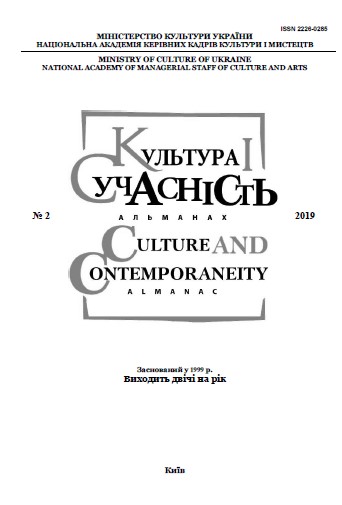ШТУЧНІ МОВИ У ФОКУСІ ЛІНГВОКУЛЬТУРОЛОГІЧНОГО ДОСЛІДЖЕННЯ
ARTIFICIAL LANGUAGE IN THE FOCUS OF LINGUISTIC AND CULTURAL STUDY
Author(s): Lysenko LiubovSubject(s): Cognitive linguistics, Computational linguistics, Theory of Communication, Sociology of Culture, Philology
Published by: Національна академія керівних кадрів культури і мистецтв
Keywords: culture; linguacultural identity; mentality; natural language; artificial language; a universal language; lingua franca; lingual construction;
Summary/Abstract: The purpose of the article is analyzing the phenomenon of artificial languages s a linguacultural phenomenon, considering them as communicative and cognitive means of interpersonal and interethnic dialogue. Trace the artificial (planned) languages and research motivation to construct them. Determine whether artificial languages anywhere in relation to natural language. Prove that learning languages with linguistic and cultural perspectives offer the prospect not only of regular communication and knowledge and cultures of different peoples to an ethnic-mental deep level. The methodology is based on the anthropocentric approach to the study of cultures through the prism of language. The scientific novelty lies in the study of the phenomenon of artificial languages from the linguacultural perspective as competitive linguistic and cultural mediators aimed at facilitating interpersonal and international communication. Conclusions. In the field of lingual culture, undeniable victory belongs to natural languages, which, unlike the routine, through the ethnic richness of color reveal to us all their mental beauty and uniqueness. This, after all, is stronger and more attractive for any universal logic and feasibility of artificial means of communication. This increase compared with the artificial complexity of the natural language does not prevent the latter serve lingua franca, offsetting lower their usability study of motivational levers economic feasibility of their use, which makes the language much more successful as a means of international communication. However, the postmodern era of "spatial turn," which is continually increasing the volume of communication, opens new possibilities in the use of language planning and another artificial linguistic object. Further computerization and work to create artificial intelligence have led to the construction of a virtual reality universe. However, solving many local problems of communication and the creation of closed linguacultural space artificial language is not in a position to help people solve the global problem - not only transmit or receive information but to understand the fullness of its meaning. Along with this to know the depth of the universe of another person, ethnic group, or nation. Instead of studying the natural language of a people is cognitive function completeness. It not only transmits a set of messages but also allows us to know another culture in its entirety mental attitude. It enables real understanding - whether on an individual or an international level. Solving many local problems of communication and the creation of closed linguistic space artificial language is not in a position to help people solve the global problem - not only transmit or receive information but to understand the fullness of its meaning. Along with this to know the depth of the universe of another person, ethnic group, or nation. Instead of studying, the natural language of people is cognitive function completeness. It doesn't only transmit a set of messages, but also allows knowing another culture in its entirety mental attitude. And it enables true understanding - whether on an individual or an international level.
Journal: Культура і сучасність
- Issue Year: 2019
- Issue No: 2
- Page Range: 25-29
- Page Count: 5
- Language: Ukrainian

